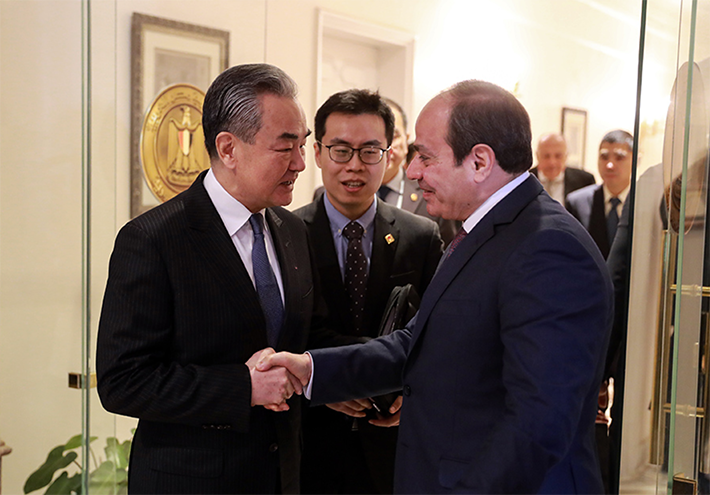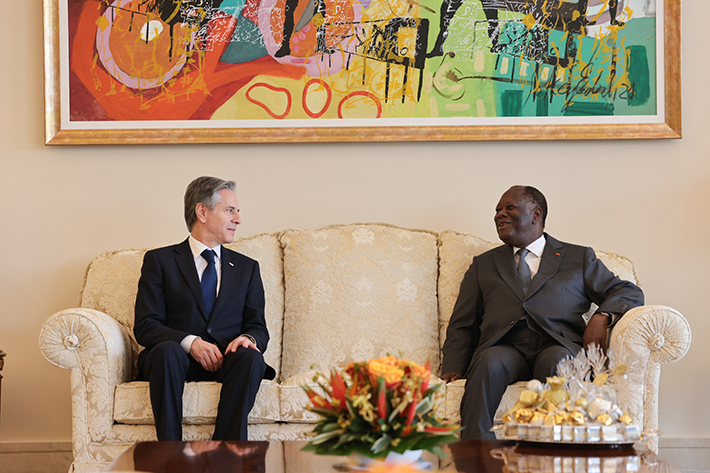|
||||||||||
| Home Nation World Business Opinion Lifestyle ChinAfrica Multimedia Columnists Documents Special Reports |
|
||||||||||
| Home Nation World Business Opinion Lifestyle ChinAfrica Multimedia Columnists Documents Special Reports |
| ChinAfrica |
| A Tale of Two Visits |
| Chinese Foreign Minister Wang Yi’s visit to Africa focuses on addressing practical issues, while US adapts to a changing reality |
| By Charles Onunaiju | VOL. 16 March 2024 ·2024-02-29 |

Egyptian President Abdel-Fattah al-Sisi meets with Chinese Foreign Minister Wang Yi in Cairo, Egypt, on 14 January (MINISTRY OF FOREIGN AFFAIRS OF CHINA)
From 13 to 18 January, Chinese Foreign Minister Wang Yi visited four African countries in keeping with the more than three decades of tradition where Chinese foreign ministers start their yearly overseas visits with a trip to Africa. However, while these visits have become a routine for China’s diplomatic practice, they are not an empty ritual. They represent a tradition of China-Africa pragmatic cooperation defined by mutual consultations and tangible outcomes. It is neither opportunistic nor paternalistic, but rather engagement in the specific issues of concern for the particular country in relation to bilateral cooperation with China and the overall framework of the broader and comprehensive China-Africa cooperation.
This year’s visit, which took Wang to Egypt and Tunisia in North Africa and Togo and Cote d’Ivoire in West Africa, reflects the broad dynamics and vigour of China’s Africa diplomacy in addressing existential practical concerns of the region. Symbolically, it gives tangible weight to China’s long-standing diplomacy and foreign policy commitment to the equality of all states in the international system, irrespective of size.
The agenda of the visit includes the outcomes of China-Africa Leaders’ Dialogue held in August 2023 in Johannesburg, South Africa, with initiatives on industrialisation, agricultural modernisation and manpower or talent developments identified as critical cooperation items to be focused and implemented. These issues are at the heart of Africa’s contemporary challenge to realise and attain a considerable measure of self-sustaining economic dynamism and ensure optimisation of potential, and would give concrete effect to regional economic integration through extensive trade and realising the benefits of a regional market.
Addressing practical issues
Togo, a small country in West Africa, whose economic mainstay is agriculture, would be in line for the important initiative of agricultural modernisation.
In Cote d’Ivoire, Wang was greeted with emotional warmth as the country hosted the 34th edition of the Africa Cup of Nations football fiesta where the four stadiums for the competition were built with Chinese assistance. The visiting US Secretary of State Anthony Blinken had a taste of the practical and tangible outcomes in China-Africa cooperation as he joined his Cote d’Ivoire host to watch one of the games in one of the stadiums built with Chinese assistance in the capital city of Abidjan.
The Cote d’Ivoire leadership expressed warm appreciation to China for always caring for the practical needs of the country and providing tangible support in various fields, and added that Africa looks forward to taking part in the next meeting of the Forum on China-Africa Cooperation (FOCAC).
In Egypt and Tunisia with long-standing diplomatic cooperation with China, Wang made a bold statement on an issue that is of concern to the sub-region. In Egypt, which shares the Refah border with Palestinian Gaza, the scene of humanitarian catastrophe from Israel’s relentless military attack in its confrontation with Hamas, he reiterated the urgency of an immediate and comprehensive ceasefire. It was also a moment to add vigour to China-Egypt cooperation, as Egypt was the first in Africa to establish diplomatic relations with China in 1956. Tunisia reaffirmed its participation in the Belt and Road Framework of International Cooperation. Overall, the four-nation tour of the Chinese foreign minister in continuation of a 34-year-old tradition resonates with innovative and tailored approaches in the specific context of bilateral relations and the wider framework of multilateral international cooperation.
It also serves the purpose of mutual consultations on the development of the agenda for the FOCAC meeting to be held later this year.

Ivorian President Alassane Ouattara meets with US Secretary of State Anthony Blinken in Abidjan, Cote d’Ivoire, on 23 January (US STATE DEPARTMENT)
Washington’s outreach
The dynamism of China-Africa relationship and its role in raising Africa’s profile in the world prompted the US to send its top diplomat to the continent soon after the visit of Wang. The US agenda was also weighty in grand eloquence, but Africa has consistently urged partners to walk their talk because the existential challenge of the region and the crucial roles it could play in shaping an inclusive global system of multilateralism through consultations and coordination go beyond simplistic acknowledgements.
Blinken toured Cote d’Ivoire, Cabo Verde, Nigeria and Angola from 21 to 26 January. Across his tour, the US secretary of state continuously raised issues of security and the US support to battle insurgents and defeat extremism in the region. In Cote d’Ivoire, while President Alassane Ouattra applauded US concerns for the region, he also highlighted his government’s commitment to improving the quality of lives of the citizens.
Unlike in the explicit strategy of seeking to contain China and Russia in Africa in a paper published in 2021, Blinken refrained from telling his African hosts to beware of China or even Russia. The US’ Africa diplomacy seems to be adjusting to the reality that Africa has come of age, as one former Nigerian leader put it, and needs not be told how to choose her friends.
African leaders have in recent times expressed very clearly that the region does not intend to be a theatre of major power conflict, but would welcome partnership from across the world to engage in issues not only about Africa, but also on peace and sustainable global security built through broad consultations. For finding numerous common grounds from equitable and balanced development to collective security, climate action and inclusive governance architecture that reflects the concerns and aspirations of all states in the global system, China and Africa have pivoted “a community of shared future” in which respect for differences, extensive consultations and dialogue define cooperation and relations that are always on the threshold of breaking new grounds.
As the US has joined in the early year sunshine of diplomatic foray in Africa, it is advised that it listens more to the voices in the region about their real and practical concerns and lectures less about the hyperbolic ideals incompatible with the existential strivings of the people in Africa.
The author is Director of Centre for China Studies, Abuja, Nigeria
|
||
| About Us | Contact Us | Advertise with Us | Subscribe |
| Copyright Beijing Review All rights reserved 京ICP备08005356号-5 京公网安备110102005860号 |